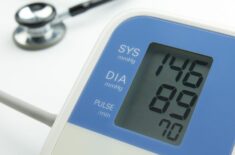Overview
Are you suspecting that you might be pregnant because of an unexplainable light and brownish blood discharge that’s quite different from your usual period bleeding?
If it’s implantation bleeding, then there may be no reason for you to worry. However, this doesn’t mean that you should simply dismiss it.
Around one-fourth of pregnant women experience spotting or bleeding as one of their early signs of pregnancy. About half of those women will miscarry. (1)
By the end of this article, you’ll have a deeper understanding of implantation bleeding and how it’s different from your menstrual period or other bleeding. You’ll also learn about why implantation bleeding happens, when you should take a pregnancy test, and when to see a doctor.
How Do I Know If It’s Implantation Bleeding Or My Last Period?
When you’re trying to conceive or think that you might be pregnant, you might interpret even the slightest change in your body as a sign of pregnancy.
Implantation bleeding happens around 10-14 days after conception, around the same time that you may be expecting your monthly period.
This is why it’s usually difficult to distinguish if it’s implantation or menstrual bleeding.
Let’s break down their differences:
1. Color
Implantation bleeding is usually brown in color.
Dr. Yen Tran, an OB-GYN at Orange Coast Medical Center in Fountain Valley, California, said that “implantation bleeding may look like pinkish/rusty old brown body discharge.” (2)
During your heavy-period days, blood is usually red. On lighter days, it can also be pink, brown, or black. (3)
2. How much do you bleed with implantation bleeding?
Implantation bleeding is lighter in flow, usually has no clots, and won’t require you to change pads often. This is why you might confuse it with a light period. Menstrual bleeding is heavier and can contain clots.
3. Timing
Implantation bleeding usually occurs around 10-14 days after conception. If you experience light bleeding or spotting before your expected period, you may suspect that it’s implantation bleeding.
As mentioned, the timing can also coincide with the time of your menstruation, around 11 to 14 days after ovulation. This is why it’s quite confusing to differentiate one from the other. So a pregnancy test might be your best bet. (2)
4. Can you bleed heavy for 2 days and still be pregnant?
Implantation bleeding can last for a few hours up or to two days compared to 4 to 7 days for period bleeding.
In between menstruation cycles, some women may experience spotting during ovulation because of hormonal changes. Spotting related to ovulation can last from1 to 3 days and isn’t a cause for concern.
5. Cramping pain
Implantation cramping pain is usually fainter or lighter than normal period cramps. (4) Women who usually experience menstrual cramping may confuse the two because they can feel the same.
Spotting or light bleeding is a symptom brought about by different factors in early pregnancy, including implantation. (5)
Dr. Cesar Diaz-Garcia of IVI London Clinic says that these symptoms are not always indicators of pregnancy because they’re common in many other physical or mood states. (6)
Spotting is a symptom of various pregnancy or non-pregnancy-related conditions. For example, spotting can be a symptom of implantation bleeding, ovulation, trauma, or the use of birth control pills.
Around 25% of all pregnant women will experience some bleeding or spotting at some point in their pregnancy. (7)
Can implantation bleeding look like a period?
Implantation bleeding looks like spotting or light bleeding. Your underwear may just have a few drops of blood and you might need to use a panty liner. Heavy bleeding, like your period, requires a tampon or maxi pad. (8)
Pregnancy hormones may also cause changes to your cervix and cause spotting.
Sometimes, vaginal bleeding or spotting can also be caused by infection.
Light vaginal bleeding or spotting without pain is common before 12 weeks of pregnancy.
After this 12-week period, bleeding may not be considered normal or common. (5)
Either way, it’s best to check with your health care provider if you experience bleeding after 12 weeks gestation.
In women of childbearing age, pregnancy is the first consideration in abnormal uterine bleeding. By definition, bleeding before 20 weeks of pregnancy constitutes threatened abortion, but most of these pregnancies continue normally. (1)
It’s only through your doctor’s examination that you can officially determine if your discharge is implantation bleeding or something else.
Timing Of Implantation Bleeding – When Does It Occur?
Timing is critical if you’re trying to pinpoint the cause of your bleeding.
Implantation bleeding (or cramping) occurs between 10 to14 days after conception.
When the fertilized egg is implanted in your uterine wall, the placenta begins to form.
At this point, the level of hCG hormones (human chorionic gonadotropin) will begin to increase.
Around two weeks after, you can take a pregnancy test to detect the hCG levels in your urine and find out if you’re pregnant.
Higher hCG levels mean pregnancy is likely occurring and can be sustained.
If pregnancy doesn’t occur, the uterine lining will begin to shed and this is what causes period bleeding.
Trace levels of hCG can be detected from early pregnancy around eight days after ovulation. That means you could get a positive result several days before you expect your period to start. (9)
Regular home pregnancy tests are most accurate after successful implantation bleeding has taken place and/or you’re days late on your expected period.
Implantation doesn’t happen until after the first day of a missed period in about 10% of women. (10)
There are also over-the-counter pregnancy tests that might provide a positive result before implantation.
Some early pregnancy detection kits available are:
- First Response Early Result Pregnancy Test
- Clearblue Early Detection Pregnancy Test
If you’re hoping to get pregnant and your result comes out negative, you can try again after a few days using another pregnancy test.
Keep in mind that your pregnancy test may show a false negative result if you do the test too early and your hCG levels haven’t reached 5 ml/U, the minimum score for the hormone to be detected. (11)
On the other hand, you may also have a false-positive result due to: (12)
- Pregnancy loss right after the fertilized egg attaches to your uterine lining
- Taking the pregnancy test too soon, especially if you’re taking fertility drugs with hCG
- Ectopic pregnancy (fertilized egg implanted outside of the uterus, usually in the fallopian tube)
- Problems with your ovaries (like PCOS (polycystic ovarian syndrome) or corpus luteum cysts)
It’s interesting to note that hCG levels can be lower in women carrying a baby boy. (13)
Again, real confirmation can only be provided by your doctor who will take your blood sample and perform vaginal and ultrasound examinations.
Symptoms Of Implantation Bleeding
Since it’s called implantation bleeding, spotting is its main symptom.
However, implantation bleeding may also be accompanied by:
- Cramps in your abdomen
- Pelvic pain
- Lower back pain
Keep in mind that different women have different early pregnancy symptoms, and implantation bleeding doesn’t happen to all women or all pregnancies.
Symptoms of pregnancy that usually accompany implantation bleeding are:
1. Missed menstrual period.
This may not be a reliable symptom for those with irregular periods. But if your period is late by one or more weeks, it may indicate pregnancy.
2. Breast tenderness.
Hormonal changes due to pregnancy can make your breasts sore and feel heavy or fuller.
3. Fatigue.
You may notice that you feel more fatigued or tired than usual around a week after conception. This is a side effect of progesterone hormone levels rising to maintain your pregnancy and eventually promote milk production in your breasts. As a result, your blood volume also increases in order to provide nutrients for your growing baby.
4. Headaches.
Rising pregnancy hormone levels may also cause headaches.
5. Nausea and/or vomiting.
These symptoms are also part of “morning sickness.” This may begin around two to eight weeks after conception and can strike any time of the day.
6. Aversions or cravings for certain foods.
During your pregnancy, you may suddenly dislike certain foods and strongly crave others.
7. Mood swings.
Pregnancy hormones may cause intense mood swings.
8. Frequent urination.
Your body secretes hCG in the early weeks of your pregnancy. It’s a hormone that increases blood flow to your pelvis and makes you want to pee often.
9. Bloating.
This bloatedness may be the same as what you experience before your period. However, in pregnancy, this may be caused by different hormonal changes.
10. Constipation.
Your increased progesterone levels are also causing your digestive system to slow down, which can cause constipation.
Why Does Implantation Bleeding Happen?
Your ovary releases an egg into your fallopian tube.
When an egg is fertilized, cell division begins to produce the embryo. This embryo travels from the fallopian tube to your uterus.
Implantation happens when the fertilized egg attaches to the lining of the uterus. This implantation process takes place between six and ten days once fertilization has taken place.
Your uterus is well supplied by blood vessels so it’s quite prone to bleeding.
Some blood vessels may be broken during the implantation process, which can result in some light bleeding and consequent spotting.
Implantation bleeding occurs between 10 to 14 days after conception. This is the usual time it takes for the embryo to reach the uterus. (6)
Implantation is an important process in early pregnancy because the perfect implantation ensures the proper exchange of nutrients between you and your baby thanks to the placenta, which is also beginning to form at this time. (6)
Don’t feel bad if you’re pregnant and you didn’t experience implantation bleeding. Many women don’t experience or notice implantation bleeding. (4)
Implantation Bleeding Concerns: Should You Be Worried?
Implantation bleeding is normal, and it doesn’t pose a risk to you or your baby. (14)
Light bleeding or light spotting without pain is common before 12 weeks of pregnancy. (5)
Usually, bleeding that’s related to other gestational problems is accompanied by more intense and painful symptoms. Also, problems like miscarriage or ectopic pregnancy may occur without bleeding. (6)
Implantation bleeding doesn’t require special measures, but it’s always best to consult your OB-GYN if you’re in doubt. (6)
Your doctor can confirm if your bleeding is because of embryo implantation and give you the proper guidelines on what to do next.
Other Causes Of Bleeding During Early Pregnancy
1. Sexual intercourse/ Pap test/ pelvic exam
It’s common to have light bleeding after these activities.
2. Hormones
More blood vessels continue to develop in the cervical area because of pregnancy hormones. This can cause the cervix to bleed easily during pregnancy.
3. Birth control pills
The use of birth control pills can cause spotting or bleeding between periods. (15)
4. Cervical problems
Inflammation, abnormalities, or infection of the cervix may cause vaginal bleeding.
5. Infections
Vaginal infections and sexually transmitted diseases may cause vaginal bleeding.
6. Ectopic pregnancy
An ectopic pregnancy is when a fertilized egg is implanted outside of the uterus, usually in one of the fallopian tubes. (16)
If this happens, the egg will not develop into a baby, and your health may be at risk if the pregnancy continues. It has to be removed by medicine or an operation. (16)
If it is an ectopic pregnancy, bleeding usually starts and stops. It may also be watery and dark brown in color.
7. A threatened miscarriage or abortion
This type of vaginal bleeding indicates that a pregnant woman may be at higher risk of having a miscarriage.
It could happen in the first three months of pregnancy.
Things that may put you at risk of threatened miscarriage are: (17)
- Infection
- Age
- Trauma
- Certain medications
8. A miscarriage
Pregnancy loss during the first 13 weeks of pregnancy is called a miscarriage. (18)
Bleeding and cramping can be symptoms of miscarriage. According to ACOG (American College of Obstetricians and Gynecologists), half of the women who have miscarriages don’t bleed beforehand. (18)
9. A molar pregnancy
A molar pregnancy is when fertilization goes wrong and leads to the growth of abnormal cells or a cluster of water-filled sacs inside the womb.
Vaginal discharge is characterized by blood clots or watery brown vaginal discharge. Bleeding usually begins at 6 to12 weeks of pregnancy. (19)
When To Call Your Doctor
Call your doctor right away if you have: (20)
- Heavy bleeding (soaking two pads in an hour or passing huge clots)
- Severe abdominal or shoulder pain
- Fever or chills
- Dizziness or fainting
- Vaginal discharge with an unusual smell
- Bleeding in the second half of your pregnancy
Even if your bleeding has stopped, it’s best to consult with your doctor to know what caused your bleeding and if any interventions are needed
Go to the emergency room if you can’t reach your health care provider.
REFERENCES
(1) https://www.aafp.org/afp/2009/0601/p985.html
(2) https://www.memorialcare.org/blog/what-color-implantation-bleeding
(3) https://www.nhs.uk/conditions/periods/
(4) https://americanpregnancy.org/pregnancy-symptoms/what-is-implantation-bleeding-24176/
(5) https://www.tommys.org/pregnancy-information/pregnancy-symptom-checker/bleeding-pregnancy
(6) https://www.ivi.uk/blog/what-implantation-bleeding/
(7) https://www.marchofdimes.org/complications/bleeding-and-spotting-from-the-vagina-during-pregnancy.aspx#:~:text=have%20during%20pregnancy-,Bleeding%20and%20spotting%20from%20the%20vagina%20during%20pregnancy%20are%20common,miscarriage%20or%20other%20serious%20complication
(8) https://familydoctor.org/bleeding-pregnancy-whats-normal/
(9) https://utswmed.org/medblog/home-pregnancy-tests/
(10) https://www.womenshealth.gov/a-z-topics/pregnancy-tests#:~:text=Your%20body%20makes%20hCG%20after,women%20but%20not%20for%20others.&text=Your%20body%20makes%20hCG%20after,women%20but%20not%20for%20others
(11) https://www.ncbi.nlm.nih.gov/books/NBK532950/
(12) https://www.mayoclinic.org/healthy-lifestyle/getting-pregnant/in-depth/home-pregnancy-tests/art-20047940
(13) https://www.independent.co.uk/life-style/health-and-families/health-news/parents-can-find-out-sex-foetus-after-three-weeks-9276860.html
(14) https://americanpregnancy.org/pregnancy-symptoms/what-is-implantation-bleeding-24176/#:~:text=If%20you%20have%20waited%20until,even%20when%20it%20does%20occur
(15) https://www.mayoclinic.org/healthy-lifestyle/birth-control/expert-answers/seasonale-side-effects/faq-20058109
(16) https://www.nhs.uk/conditions/ectopic-pregnancy/
(17) https://www.winchesterhospital.org/health-library/article?id=223394
(18) https://www.acog.org/womens-health/faqs/bleeding-during-pregnancy
(19) https://www.cancerresearchuk.org/about-cancer/gestational-trophoblastic-disease-gtd/molar-pregnancy/symptoms
(20) https://www.betterhealth.vic.gov.au/health/HealthyLiving/pregnancy-bleeding-problems












